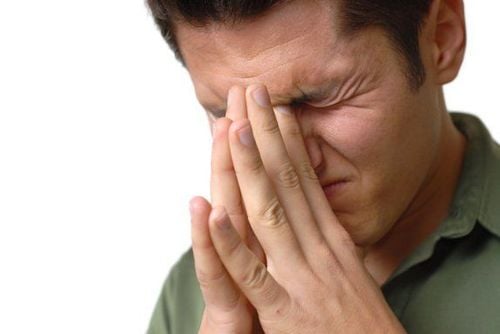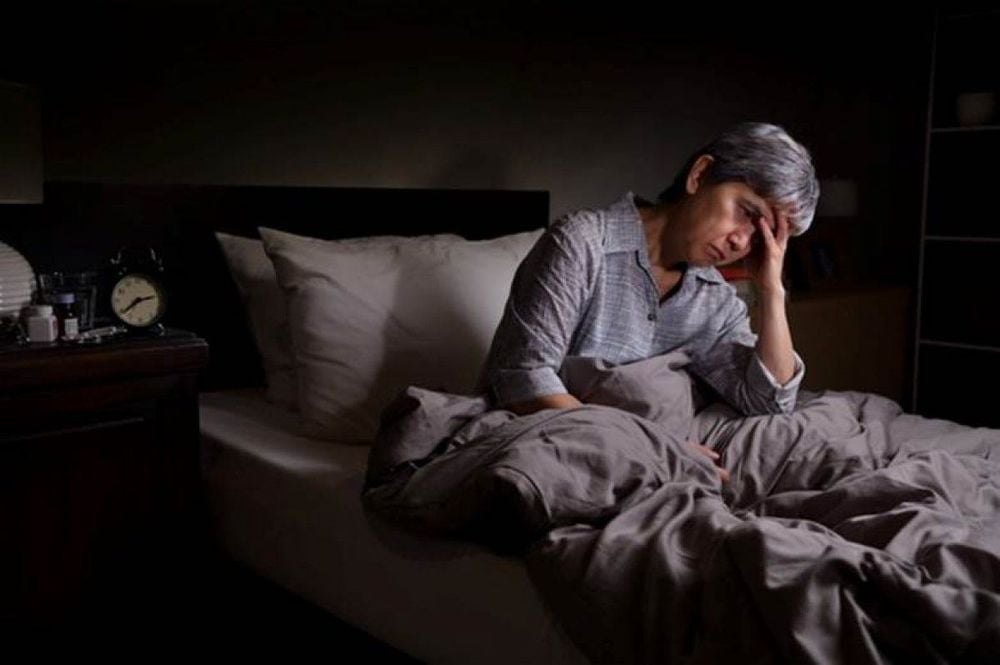This is an automatically translated article.
When pain disrupts your sleep is a hot topic today. Because there are so many people, especially in patients who are tormented by pain every day, that keep them from sleeping because of the pain. So what is the relationship between pain and insomnia?
1. What is pain?
Pain is an indicator or alarm that signals that something has happened in the body. The International Association for the Study of Pain (IASP) defines pain as an unpleasant, sensory, and emotional experience associated with actual or potential tissue damage or as described in terms of that injury. In a word, pain is an unpleasant sensation in the body in response to injury, illness or any other incident.
Pain is an unpleasant sensation we experience when nerve receptors send signals to the brain telling us something is wrong. Pain can be acute or chronic.
Acute pain is pain that lasts for a short time, such as a broken bone, but eventually heals. Chronic pain refers to pain that recurs or lasts for more than a few months such as lower back pain, recurrent headaches, fibromyalgia, rheumatoid arthritis, or pain caused by certain types of cancer such as cancer. bone cancer, lung cancer....
How our brain interprets pain depends on a number of factors, including our physical health, our mood, and the reason for the pain. When pain occurs at night, it can interfere with sleep. People living with chronic pain may experience long-term sleep deprivation.
In addition, pain is a physical and emotional signal of bodily harm that strongly promotes behavior. Humans need both pain and sleep to survive; However, chronic impairments in the pain and sleep regulation systems can have widespread negative effects on health and well-being. Sleep complaints are present in 67-88% of cases of chronic pain disorders and at least 50% of people with sleep disorders most commonly diagnosed as sleep disturbances have chronic pain or so to speak. It's understandable that you can't sleep because of the pain.
In most medical interventions, the development of pain as a side effect coincides with the development of a sleep disorder and vice versa. Furthermore, both chronic pain and sleep disturbance share a range of physical and mental health comorbidities, such as obesity, type 2 diabetes, and depression.

Cơn đau hành hạ biểu hiện của một bệnh lý của cơ thể người bệnh đang gặp phải
2. When pain interrupts your sleep
Sleep and pain seem to have a two-way relationship. For example, many people report that after a good night's sleep they are less likely to experience pain attacks. For people living with chronic pain, sleep can be an important component in the path to recovery.
Chronic pain can affect sleep in different ways and depending on the nature of the pain. Some conditions may flare up at night or be provoked by certain sleeping positions. Others may cause persistent pain that doesn't get better at night. Some causes of sleeplessness include being in a hospital or long-term care facility, a noisy environment, or an uncomfortable bed.
People with pain do not sleep, the overall sleep time is short, making the mood after waking up is not good. In fact, this appears to be the most common sleep complaint among people with chronic pain.
When we sleep, we go into light sleep, slow wave sleep, and rapid eye movement (REM) sleep. To feel well rested, we need a balance of all these sleep stages, especially slow-wave sleep and REM sleep. Disrupting this cycle will interfere with the progression of the sleep stages, and lead to restless sleep and feelings of fatigue the next day.
In addition to the inability to sleep in some people with chronic pain, one or more other medical conditions, such as obstructive sleep apnea or restless legs syndrome. Pain relievers or chronic illnesses can have side effects that interfere with sleep. Pain can also accompany anxiety, stress, and depression. These conditions can cause sleep problems in their own right and should be treated as part of an overall health plan.
According to a 2015 National Sleep Foundation Sleep in America poll, one in five Americans has chronic pain. The majority of these people reported sleep quality was substandard, and a quarter of people with chronic pain also had sleep disturbances.
2.1. Can't sleep because of pain caused by sleeping position? The type of pain can determine your sleeping position. People with hip, knee or shoulder pain such as in the case of rheumatoid arthritis may need to avoid side sleeping. Conversely, people who are sensitive to pressure buildup in the lower back may have to be careful when sleeping on their back or stomach. Cushions and pillows designed to pressure points and support the natural curvature of the spine can help alleviate some of the pain.
Other conditions that cause diffuse pain, such as multiple sclerosis. These conditions attack the nerves, which means people may need to change their sleeping positions more often to avoid numbness, tingling, and pain that makes it difficult to sleep. These people may need a more responsive mattress to facilitate movement on the headboard. Contact your carer or sleep partner for help if you are having trouble adjusting your position on your own.
2.2. The pain of not being able to sleep is due to tormenting pain? There is an unquestionable link between sleep and pain, but new evidence suggests that the effect of sleep on pain may be even stronger than the effect of pain on sleep.
Researchers have found that short sleep duration, sporadic sleep, and poor sleep quality often cause greater pain sensitivity 6 days later in chronic diseases such as rheumatoid arthritis . People with sleep problems are also at increased risk for conditions like fibromyalgia and migraines. Encouragingly, many studies have also found that in the long run, quality sleep can improve chronic pain.
Sleep and pain seem to share similar pathways and neurotransmitters. For example, Melatonin is best known for its role in regulating our circadian rhythms, and new research is beginning to explore melatonin's role in our perception of pain. Sleep loss also causes inflammation in the immune system, with corresponding effects on our body's ability to recover. Vitamin D and dopamine also seem to play a role in both sleep and pain.

Nhiều người không ngủ được vì đau nửa đầu hành hạ
Studies have found mixed results about the impact of sleep deprivation on our pain threshold and the brain's ability to inhibit pain. It is possible that sleep modifies pain through different pathways depending on the condition and type of sleep deprivation.
The ability to cope with sleep disturbances and inability to sleep also has a sociological dimension. Many studies show that when pain from insomnia increases in women more sensitive than men, young people have more endurance than older people.
People with chronic pain may feel tired throughout the day. Depending on the severity of their pain, they may be able to exercise more or follow a healthy diet, both of which are important for getting a good night's sleep. Disturbed sleep due to chronic pain can also disturb a bed-sharing partner, with corresponding consequences for your sleep quality and health.
Both adults and children with chronic pain report poor sleep quality, and those who did not sleep well also reported more intense and severe pain. Although sleep certainly plays its own independent role, researchers believe that the relationship between sleepless pain and insomnia is partly due to psychological factors.
2.3. What is the link between sleep, pain, and mental health? People with chronic pain can go through a cycle of pain, insomnia, and depression or anxiety. For example, a person with pain may become anxious when they cannot sleep. They may not sleep well and wake up feeling depressed, which increases their sensitivity to pain. The next night, they were in pain again, unable to sleep, and the cycle started again. Over time, this negativity can worsen existing conditions and even have a major effect on a person's health.
A study of patients with osteoarthritis found a link between poor sleep quality and a more active central nervous system that increases pain perception. It is estimated that one-third of people with chronic pain also have problems with clinical depression. Overall, it appears that chronic pain patients with depression have higher pain levels and poorer sleep quality.
Cognitive behavioral therapy for insomnia (CBT-I) and, to a lesser extent, cognitive behavioral therapy for pain (CBT-P20), has been shown to help with insomnia in patients with chronic pain. There is limited evidence for the effectiveness of CBT-I in people with chronic pain and co-existing conditions such as anxiety or depression. However, in patients recovering from trauma, chronic pain is reduced with careful management of sleep quality.
Pain is very different from person to person. Psychological factors are among the factors that influence the severity of the pain we feel. This does not mean that pain is not real, but it does mean that treating pain can require a multifaceted approach that is driven by these complex and diverse psychological factors. .

Đau không ngủ được cần được thăm khám và có phương pháp trị liệu phù hợp
3. Tips and Strategies for Coping With Inability to Sleep Because of Pain
People who experience permanent insomnia due to their chronic pain will likely develop an unhealthy relationship with sleep. For example, people who have trouble sleeping may rely on caffeine or stress before bed. Learning to sleep in pain begins by rehabilitating your brain with healthy thoughts and behaviors.
Deep breathing, mindfulness techniques, or guided imagery can allow you to re-feel the pain in a way that's easier to deal with. One of the main ways pain affects sleep is by keeping the central nervous system stimulated. Therefore, to achieve the effect, you should relax and not focus on the pain.
Good sleep habits start in the morning, so make sure you get enough sunlight, exercise daily and have a healthy diet every day. Avoid stimulants, such as tobacco, caffeine, or alcohol. Meditation can also help cope with pain and promote better sleep quality.
To break the cycle of negative thoughts, avoid bringing life's daily complications into your bedroom. The bedroom should be a calming refuge that should only be for sleep and sex. Keep your place cool, dark, and quiet at night, and go to bed and wake up at the same time every day. It can be helpful to do a bedtime routine in a sequence such as showering, brushing teeth, reading a light book, and then turning off the lights.
If you find yourself thinking again or if you're too sore to sleep, don't stay in bed. Get up and go to another room, then get distracted with other things for a while. When you feel sleepy, try going back to sleep.
Talk to your doctor or mental health professional for more help with sleep and pain management. They can recommend complementary therapies or prescribe medication to help you sleep better.
Please dial HOTLINE for more information or register for an appointment HERE. Download MyVinmec app to make appointments faster and to manage your bookings easily.
References: webmd.com, sleepfoundation.org, health.harvard.edu












